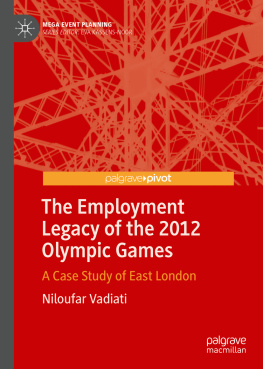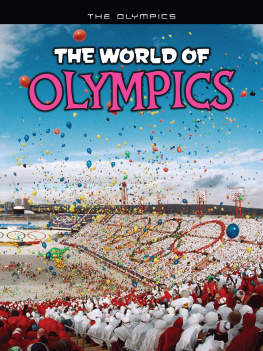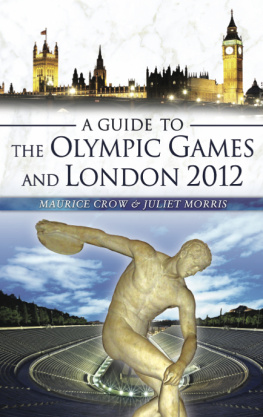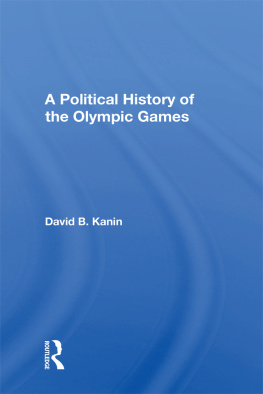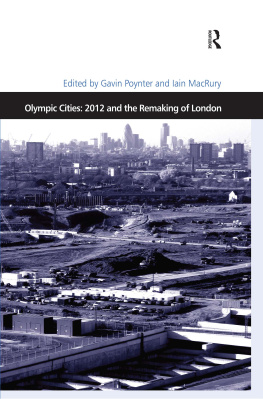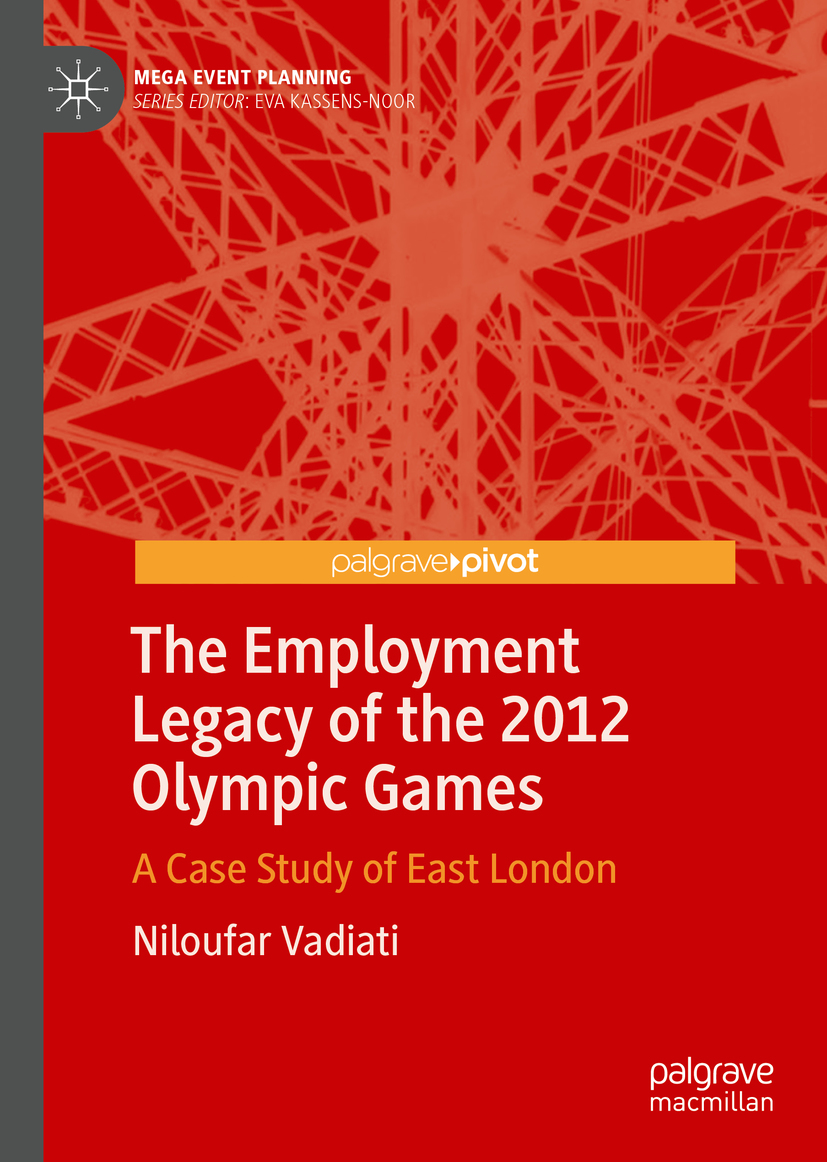Mega Event Planning
Series Editor
Eva Kassens-Noor
Michigan State University, East Lansing, MI, USA
The Mega Event Planning Pivot series will provide a global and cross-disciplinary view into the planning for the worlds largest sporting, religious, cultural, and other transformative mega events. Examples include the Olympic Games, Soccer World Cups, Rugby championships, the Commonwealth Games, the Hajj, the World Youth Day, World Expositions, and parades. This series will critically discuss, analyze, and challenge the planning for these events in light of their legacies including the built environment, political structures, socio-economic systems, societal values, personal attitudes, and cultures.
More information about this series at http://www.palgrave.com/gp/series/14808
Niloufar Vadiati
The Employment Legacy of the 2012 Olympic Games
A Case Study of East London
Niloufar Vadiati
HafenCity University Hamburg, Hamburg, Hamburg, Germany
Mega Event Planning
ISBN 978-981-15-0597-3 e-ISBN 978-981-15-0598-0
https://doi.org/10.1007/978-981-15-0598-0
The Editor(s) (if applicable) and The Author(s), under exclusive license to Springer Nature Singapore Pte Ltd. 2020
This work is subject to copyright. All rights are solely and exclusively licensed by the Publisher, whether the whole or part of the material is concerned, specifically the rights of translation, reprinting, reuse of illustrations, recitation, broadcasting, reproduction on microfilms or in any other physical way, and transmission or information storage and retrieval, electronic adaptation, computer software, or by similar or dissimilar methodology now known or hereafter developed.
The use of general descriptive names, registered names, trademarks, service marks, etc. in this publication does not imply, even in the absence of a specific statement, that such names are exempt from the relevant protective laws and regulations and therefore free for general use.
The publisher, the authors and the editors are safe to assume that the advice and information in this book are believed to be true and accurate at the date of publication. Neither the publisher nor the authors or the editors give a warranty, express or implied, with respect to the material contained herein or for any errors or omissions that may have been made. The publisher remains neutral with regard to jurisdictional claims in published maps and institutional affiliations.
Cover nemesis2207/Fotolia.co.uk
This Palgrave Pivot imprint is published by the registered company Springer Nature Singapore Pte Ltd.
The registered company address is: 152 Beach Road, #21-01/04 Gateway East, Singapore 189721, Singapore
Preface
The use of large-scale events, such as Olympic Games , to foster urban development has been called the festivalisation of urban policy . The number of cities pursuing this strategy rose after Los Angeles experienced remarkable fiscal benefits from its staging of the 1984 Olympic Games and Barcelona revitalized its beachfront by using the 1992 Olympic Games to demolish its industrial buildings. But the number of cities competing to host the Olympics dropped after many highly publicized scandals regarding cost overruns, as in Athens prior to the 2004 games, and the displacement of locals, as in Beijing 2008, Rio 2016 and Sochi 2014.
This pivot offers new insights into spectacle-driven development policy by focusing on an under-researched aspect: employment. While studies of the socio-economic impacts of large-scale events mainly focus on such topics as fiscal effects, impacts on direct investment, tourism and international reputation, this study concerns labour market mobilisation and locals share in the Olympic job market.
The pertinent literature tends to focus either on the planning and staging of the (temporal) event or on the (long-term) socio-economic and socio-material impacts. Studies with the former focus mostly revolve around issues of project management and delivery; the latter is concerned with matters of urban development . This research seeks to bridge the gap between these two discursive territories by explicitly addressing the question of how the imperatives of project management and delivery shape the longer-term consequences of large-scale Olympic projects within host cities and among local people.
This study examines the London 2012 Olympics for two reasons: It pioneered a concern with the events social legacy and it placed employment at the core of its legacy agenda. Regarding the global job market of London, this study provides an empirical account of how the worlds biggest mega-event was experienced in terms of employment by residents of its immediate host, East London , one of the UKs poorest, most ethnically complex and transient areas.
Given my background as an urban planner, I investigate the urbanity of the Olympics through one of its social-economic courses, which is the distribution of job opportunities. My familiarity with ethnic communities in East London inspired me to approach the subject as an ethnographer and provide an empathetic understanding of locals career drives , aspirations and values.
The motivation behind this research at its outset came from my own experience as a UCL MSc graduate with a migration background who was then residing in London. In 2010, I was eager to obtain one of London 2012 s skilled jobs, at a time when the London labour market was suffering from the UK economic recession. What I witnessed during the job-seeking process went beyond the negotiation over the companies openings; it was rather a renegotiation of place ownership and a redefinition of identity. Thus, I became interested in more in-depth examination of how people pursue their careers in a complex and changing environment, which was then facing sport-led urban regeneration .
Although this study focuses on the reality of the employment legacy of London 2012 , the findings may well have a bearing on the idea that hosting a mega-event such as this could lead to the reproduction of inequality in the local labour markets of host cities . I hope that the present account will contribute to future discussions by providing a valuable contextualisation.
Niloufar Vadiati
Hamburg, Germany
Acknowledgements
I am indebted to all those individuals who gave up their time to talk to me about their experiences working for the 2012 Olympic Games or living nearby. I was fortunate to be able to interview them and I hope this project does justice to their accounts.
Also, thanks to all the London 2012 staff I interviewed, particularly Mr Klaus Grewe, for providing key understandings about professional life at a high-profile mega-project.
Also, I thank my advisor, Dr Joachim Thiel, for his hugely valued support, and Dr Paul Watt, for providing critical insight into this study.
Abbreviations
CEA
The Construction Employer Accord
CLM
A consortium of CH2M Hill, Laing ORourke and Mace
DCLG
Department of Communities and Local Government
DCMS
The Department for Culture, Media and Sport
GLA
The Greater London Authority
IMD
The Index of Multiple Deprivation
IOC
The International Olympic Committee

